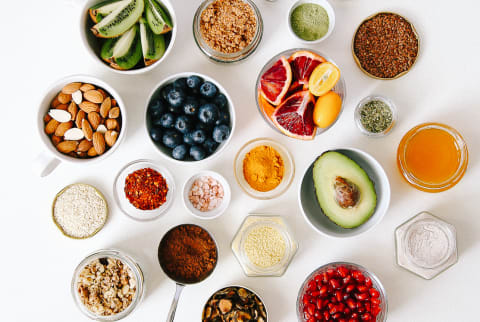Advertisement
A Neuroscientist's Go-To Nutrients For Brain & Memory Support


More than 6 million Americans, age 65 and older, are living with Alzheimer's disease. According to the Alzheimer's Association, that number is expected to rise to more than 12 million Americans by 2050.
So, while misplacing keys or forgetting someone's name are harmless human mistakes, those memory lapses over time can grow concerning. Thankfully, our brain and memory function isn't entirely out of our control.
The brain is constantly undergoing neuroplasticity, meaning it's growing and changing throughout our lifetime. One way to support that process and enhance memory function is by eating functional foods, neuroscientist and neurodegenerative disease researcher Kristen Willeumier, Ph.D., tells mbg.
Here are her go-to nutrients and food sources for a sharper brain:
Omega-3 fatty acids
Omega-3 fatty acids are a form of polyunsaturated fat (aka the "good" kind of fat) that helps shape cognitive capacity. They're rich in eicosapentaenoic acid (EPA) and docosahexaenoic acid (DHA), which help support cognitive function, maintain the fluidity of cell membranes, and increase synaptic plasticity, Willeumier tells mbg.
In case you're curious, "The more fluid a cell membrane is, the more efficiently it performs, contributing to a healthy mood and memory. It's also crucial to cell survival, growth, and renewal," she explains.
They also support memory function by maintaining brain volume in the hippocampus (the region of the brain involved in learning and memory) as we age, she explains.
Eating sustainable fatty fish—like wild cod, salmon, mackerel, sardines, and trout—is a protein-packed way to get more omega-3s. For those on a plant-based or vegan diet, Willeumier recommends marine algae and seaweed, walnuts, almonds, chia seeds, hemp seeds, and flaxseeds.
Polyphenols
Polyphenols are a plant-based dietary antioxidant with anti-inflammatory benefits, and they're abundant in berries. "Blueberries are great for the protection of chronic disease and brain health," Willeumier tells mbg.
A 20-year study from Harvard Medical School found that the adults who ate blueberries and strawberries had the slowest rate of cognitive decline1. "They could delay cognitive decline by as much as two and a half years," Willeumier says.
Because of the blood-brain barrier, foods that protect the brain will also protect the heart, making blueberries a one-stop-shop for vascular health.
The American Heart Association published a study on more than 93,000 women between 25 and 42 years old. In an 18 year follow-up, they found that those who ate blueberries and strawberries three times per week had a greater reduction in heart attacks.
The takeaway
There's currently no cure for Alzheimer's or other forms of dementia, but instead of fearing unexpected outcomes, take control where you can. Simply adding delicious and nutrient-dense foods to your diet, like blueberries and walnuts, is one way to take initiative with your brain health.

Why Nutrition Is Key To Changing Your Relationship With Alcohol
Brooke Scheller, DCN, CNS

Why Alcohol Sabotages Your Gut Health & How To Get Back On Track
Brooke Scheller, DCN, CNS

Why Nutrition Is Key To Changing Your Relationship With Alcohol
Brooke Scheller, DCN, CNS

Why Alcohol Sabotages Your Gut Health & How To Get Back On Track
Brooke Scheller, DCN, CNS

Why Nutrition Is Key To Changing Your Relationship With Alcohol
Brooke Scheller, DCN, CNS

Why Alcohol Sabotages Your Gut Health & How To Get Back On Track
Brooke Scheller, DCN, CNS

Why Nutrition Is Key To Changing Your Relationship With Alcohol
Brooke Scheller, DCN, CNS

Why Alcohol Sabotages Your Gut Health & How To Get Back On Track
Brooke Scheller, DCN, CNS














